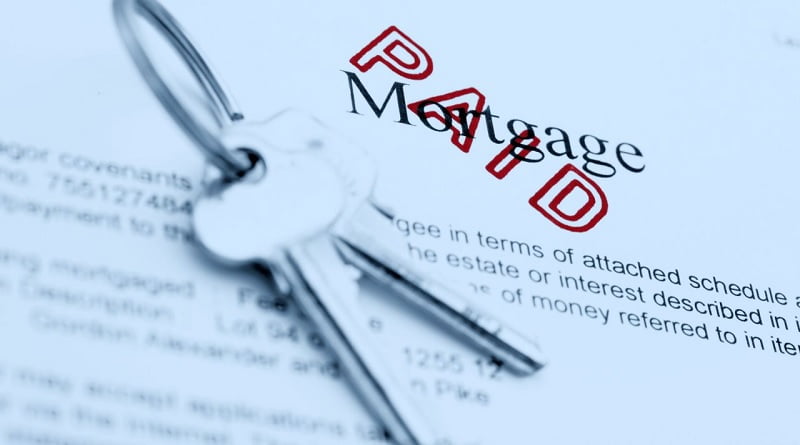HOW TO PAY OFF YOUR MORTGAGE EARLY TO SAVE ON INTEREST AND REDUCE YOUR DEBT
Most of us take out a mortgage when we buy a home and agree to make payments for up to 30 years in the process. But government estimates show that Americans move an average of 11.7 times in their lifetime, so many people start chipping away at decades of mortgage payments more than once. With that in mind, it can be smart to look for ways to pay off your mortgage early, either so you can build equity faster or save money on interest. Eventually, owning your home outright should be the goal. After all, it’s much easier to retire or cut down on working hours later in life if you’re able to ditch your monthly mortgage payment.
With that in mind, it can be smart to look for ways to pay off your mortgage early, either so you can build equity faster or save money on interest. Eventually, owning your home outright should be the goal. After all, it’s much easier to retire or cut down on working hours later in life if you’re able to ditch your monthly mortgage payment.
4 ways to pay off your mortgage quickly
But, how can you pay off your mortgage early? Fortunately, the vast majority of today’s mortgages are free of prepayment penalties, meaning you can pay off your home as fast as you want.
So if you’re wondering how to lower your mortgage payments or pay off your home faster, here are several tried and true strategies that can help. Just remember that the right strategy for you depends on how much “extra” cash you have lying around, as well as how much of a priority it is for you to become mortgage-free.
Pay more than the minimum

Imagine you purchase a $360,000 property with $60,000 as a down payment, and the interest rate on your 30-year home loan is 3%. A quick look at a mortgage calculator shows the principal and interest payment on your loan works out to $1,264.81 each month.
You could just make that $1,264.81 monthly minimum payment and cover the interest charges and part of your principal balance. However, paying more than the minimum on your mortgage would result in every “extra” dollar going directly toward your principal.
If you started this mortgage paying an extra $100 per month from day one, you would save $19,437 in interest payments and knock more than three years off your repayment timeline. Or, if you paid an extra $200 a month, you would save $34,428 in interest payments and pay off your home loan in 24 years instead of 30.
And the news gets better and better if you’re able to increase your monthly payment more over time, because again, every dollar over the monthly minimum goes entirely toward paying down your mortgage.
Make biweekly mortgage payments
While you can choose to pay any amount over your minimum mortgage payment each month, you can also opt for biweekly mortgage payments instead of paying monthly. With biweekly payments, you’ll wind up making 26 half-payments toward your mortgage over the course of a year, versus the 12 full payments you would normally make — which is the equivalent of only 24 half-payments.
Since a calendar year is technically made up of 52 weeks and not 48 weeks, you end up making two extra half-payments each year using this strategy. That’s equivalent to one full extra mortgage payment each year, which can help you reduce interest payments and own your home faster.
Based on this example, an extra mortgage payment (principal and interest only) would ultimately save you $21,418 in mortgage interest and shave three years and six months off your mortgage repayment timeline.
Just make sure you do not pay a fee to your mortgage company in order to make biweekly payments. If your mortgage servicer doesn’t offer this option, you can roughly accomplish the same goal by mailing in one extra mortgage payment each year, or by taking the principal and interest of your mortgage payment, dividing it by 12, and adding that amount to your monthly payment.
So, in the example above, you would divide $1,264 by 12, which equals $105, and add that amount as an overage toward your principal balance each month. It’s not exactly the same result as making biweekly payments, but it’s very similar.
Pay a lump sum toward the principal balance

If you receive some sort of windfall, such as an inheritance or a large tax refund, you can also consider making a lump sum payment toward your mortgage. Doing so would immediately reduce the principal balance you owe, which would help you save money on interest and shorten your repayment timeline in one fell swoop.
Using the same example above, let’s say you inherited $10,000 and decided to throw it on your mortgage right after you purchased your home. In this case, you would save more than $14,000 in interest over the term of your mortgage, and you would also pay off your home loan over a year and a half earlier than originally planned.
Refinance your mortgage
Thanks to today’s still-relatively-low mortgage rates, you can also pay off your home faster, save money on interest or both by refinancing your mortgage into a new home loan. According to recent statistics from mortgage giant Freddie Mac, borrowers who refinanced their primary mortgage in the first half of 2021 lowered their interest rate by more than 1.2% on average.
Freddie Mac also says that borrowers who refinanced from one 30-year home loan to another during this timeline saved over $2,800 annually in principal and interest payments.
However, 30% of borrowers during this period chose shorter-term loans when they refinanced, usually going from a 30-year home loan to a 15-year mortgage. This step lets borrowers knock out their mortgage faster with a one-two punch — first through lower interest rates, and then through higher principal payments.
While a 15-year mortgage will come with a higher payment, you’ll inevitably pay off your principal balance and build equity faster. If you’re wondering how to refinance your mortgage, checking rates with at least three or four different lenders is the best way to get started. Using a online loan marketplace like LendingTree is one easy way to get offers from multiple lenders at the same time.
Of course, you don’t actually have to refinance your mortgage to pay it off in half the time. You can also stick with the mortgage you have, then use a mortgage calculator to see how much in extra payments you need to make to pay off your mortgage in 15 years instead of 30. Using our example from earlier of a 30-year mortgage for $300,000 at 3%, you’d need to pay a little over $800 in extra principal payments toward your mortgage each month to own your home outright in 15 years instead of 30.
Should you pay off your mortgage early?
While you can pay off your mortgage early, should you really do it? That question can only be answered by you, and the right answer depends on your goals and your personal risk tolerance.
Since mortgage rates are still relatively low — though no longer historically low — it can make sense to tackle other debts you have before you worry about prepaying your mortgage. If you have high interest credit card debt and other unsecured debts, then it almost always makes more sense to focus on repaying those debts off first.
In the meantime, you should strive to have an emergency fund to cover surprise expenses that could arise if you face a loss in income, lose your job or wind up having to pay unexpected expenses. After all, prepaying your mortgage may help you build home equity, but that equity is locked away where you can’t access it quickly if you need it. With that in mind, most experts suggest having a fully stocked emergency fund with at least three to six months of expenses you can easily access if you need to.
Finally, you should make sure you’re adequately saving for retirement and other goals before you get too aggressive about paying off your mortgage. Owning a home outright can make reaching retirement considerably easier, but you need to save cash for retirement, too.
Ultimately, paying off your mortgage early is a smart way to build your net worth faster and save money along the way. However, make sure you have all your financial ducks in a row first before embarking on paying down your mortgage ahead of schedule.










